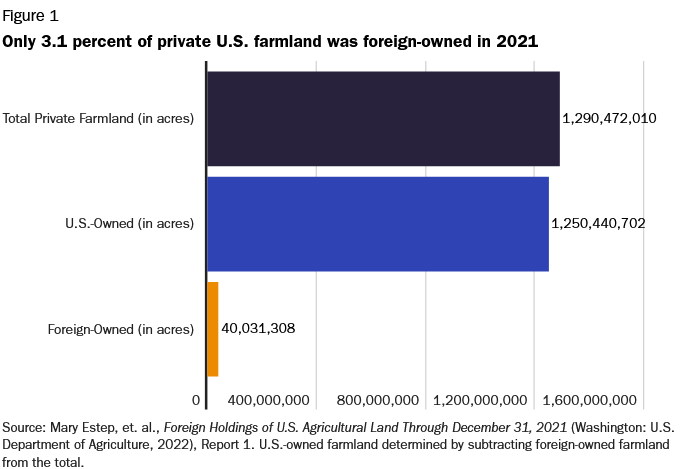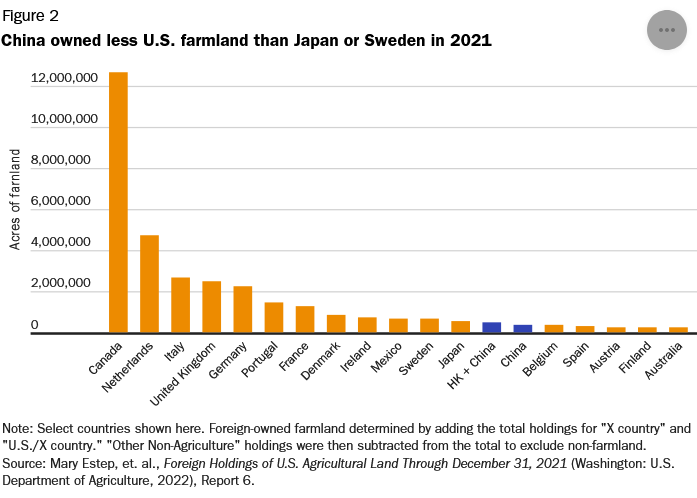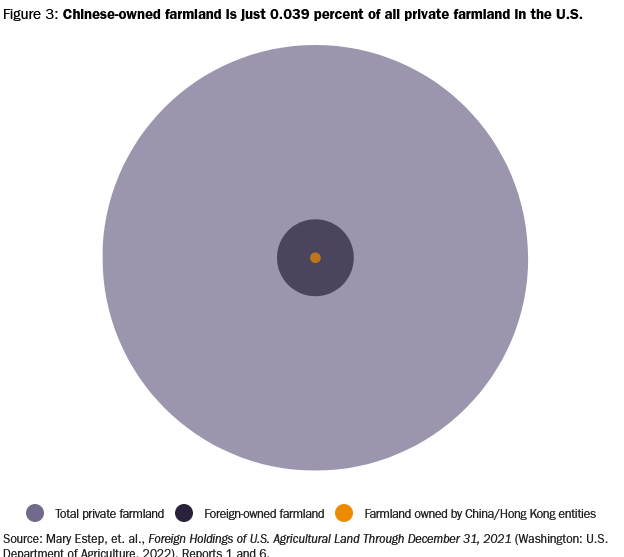More On: Chinese
China could have up to six more 'illegal police stations' in the US and hundreds all around the world
Police Arrest Leaders of an Illegal Chinese Police Station in New York City
Chinese Ownership of American Farmland: Sorting Wheat from Chaff
Hunter Biden says he is poor when he tries to cut child support for his 4-year-old daughter
Republican senators demand that Facebook turn over FBI communications about Hunter Biden
It's not apparent why Chinese ownership of farms in the U.S. is usually a bad thing.
Due to increased economic and geopolitical tensions between the U.S. and China, there have been many suggestions in Congress to separate the two economies, reportedly for national security reasons. Several of these plans would make it very hard or even impossible for Chinese people or corporations to own farmland in the United States. This is because of the tensions outlined above and the fact that more Chinese people or companies have been buying farmland in recent years.
Buying U.S. land by a foreign government or an entity controlled by a foreign government (like a company) can generate serious national security concerns that would require federal inspection or involvement. Luckily, there isn't much evidence right now that foreign agricultural purchases, especially by Chinese companies, are a good enough reason for the kind of extensive government restrictions that some people in Congress are thinking about.
First, it's important to view recent rises in foreign and Chinese ownership in the right context. Even though the proportion of U.S. farmland held by foreigners increased between 2009 and 2019, the most recent statistics from the federal government (for 2021) shows that these parcels still only make up 3.1% of total private farmland in the U.S. (see Figure 1). The United States Department of Agriculture (USDA) says that land owned by foreigners includes both land owned by foreigners alone and land owned by both American and international investors.
Also, Chinese entities still have a very little role in this tiny piece of private farmland in the United States. Figure 2 shows that Chinese entities own less than 1% of all foreign farmland. Most of the land is owned by companies and people in countries that are close allies of the United States, like Canada (30%), the Netherlands (12%), Italy (6%), the United Kingdom (6%), and Germany (6%). (6 percent). Even if you add Hong Kong to China's totals, the statistics don't alter much. Hong Kong is still only 1,2% of all foreign-owned farmland. Tori Smith of the American Action Forum says that China's farmland in the United States is worth the tenth least compared to farmland in Japan, Sweden, Canada, the Netherlands, and Germany.
Overall, these numbers show that China or China and Hong Kong together made up a tiny 0.03 or 0.04 percent of all private agricultural land in the United States in 2021. (see Figure 3). To put that in perspective, if all of the private farmland in the U.S. were a gallon of milk, China's holdings would only cover a fourth of a teaspoon.
This is not anything that screams "national security crisis!"
Also, there are multiple reasons why even these small numbers probably overstate how dangerous it is for China to hold U.S. agriculture. First, Cato scholar Dan Griswold says in an upcoming opinion piece that most of the "Chinese" land in question is "other agricultural" land, not cropland or forest, and that most of this "other" land is owned by a Hong Kong-based private company that bought U.S. pork producer Smithfield in 2013. Even though the purchase was controversial at the time, the Committee on Foreign Investment in the United States (CFIUS), which is part of the U.S. government, evaluated and authorized it. Since then, it hasn't caused any severe land-related problems.
Second, it's not apparent why Chinese ownership of farmland in the United States is a concern in general. The Chinese government can't grab the land, and the U.S. government could (and probably would) take it over in times of war or other national emergencies. Also, even if China bought a lot more land, they wouldn't be able to dominate hundreds of millions of acres of farmland or other land in the United States unless they bought a lot more land at a very fast rate, which is impossible. This includes 640 million acres of property held by the federal government, of which millions are already used by American ranchers to let their cattle graze. Since 1948, scientific and technological advances have tripled agricultural productivity, which means that we produce three times as much food on the same amount of land. This means that Americans require less farmland.
Even with all of this, some foreign land holdings could pose a threat to national security, and there may be potential for improvement in this area. Specifically, data on farmland owned by foreigners near high-security facilities, including military bases, might be better. As the Center for Strategic and International Studies pointed out in 2021, the only federal law about foreign agricultural ownership is the Agricultural Foreign Investment Disclosure Act (AFIDA), which relies on self-reported data from foreign businesses. Also, the USDA does not examine the AFIDA data for correctness, and the agency rarely fines corporations for not reporting data. Others have said that the present statistics on agriculture has similar problems.
Also, U.S. standards for screening investments could be changed so that CFIUS can assess foreign purchases of farmland near military bases. For instance, the Chinese agribusiness company Fufeng recently bought land 15 miles from Grand Forks Air Force Base, even though the Air Force said in writing that the transaction was a threat to national security. CFIUS, on the other hand, decided that it didn't have the power to stop the purchase. (Ultimately, the Grand Forks, N.D. city government stopped the corn mill proposed at the site, although Fufeng still owns the land.)
Given these two problems, it may be time for Congress to update the data the government has on farmland owned by foreigners and make sure that serious problems with national security can be fixed. Some laws, such the FARM Act, the Protecting Military Installations and Ranges Act, and the SOIL Act, have suggested changes in this area, albeit they may all be better in some ways. Given the legal, economic, and practical problems that would arise if the federal government put a lot of restrictions on private land transactions (which usually involve American citizens), these kinds of actions shouldn't be thought about until more narrowly targeted measures are put in place, data is improved and other problems are found. In the meantime, though, there's not much to worry about with the great bulk of foreign farmland holdings, including China's quarter teaspoon.

























